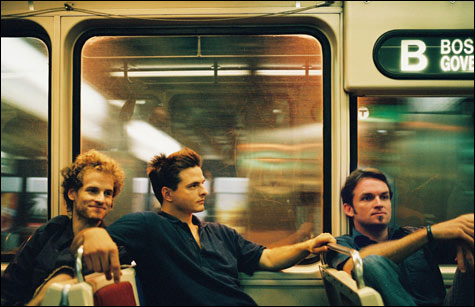
NOT A BAND: But would Chad Urmston, Pete Heimbold, and Brad Corrigan have been able to book a three-night benefit for Zimbabwe relief at Madison Square Garden if they’d stayed together and signed to a major label?
|
Dispatch aren’t even supposed to be a band anymore. Indeed, they broke up three summers ago, with a farewell show at the Hatch Shell that drew more than 100,000 fans from around the world. “The Last Dispatch,” as it was dubbed, became the centerpiece of a documentary that detailed the trio’s rise over the course of eight years to become one of the dominant jam bands in the Northeast, if not in America. Like Phish, they did it without much help from press, radio, or even a label. They simply spread their particular jam-band gospel — a mix of light reggae and funk with long, dubby dance breakdowns — through word of mouth and self-released albums. And when they finally began to show up on the commercial radar by selling out venues like the Pavilion here in Boston, and a big major-label cash-in became a real prospect, Brad Corrigan, Pete Heimbold, and Chad Urmston realized that they’d grown too far apart as people to continue as a band.
It was a decision that baffled many, given the money that was at stake. But as artists they had never been an easy outfit to nail down. In fact, it’s three years later and Dispatch don’t sound broken up. I’m sitting with the three of them at the Willis family barn, a holy shrine in the tale of Dispatch. Situated about a half-hour outside of Boston in Sherborn, surrounded by grazing cows, this was Dispatch central for eight years. Urmston, who plays guitar and bass and sings and writes (so does Heimbold; Corrigan does drums and singing and writes), grew up down the road a bit. But his family have got just a horse and some chickens. No cows. And, it seems, no barn big enough to serve as a rehearsal space/clubhouse. The three have convened here to begin practicing for a reunion gig of sorts: “Dispatch: Zimbabwe,” on July 13, 14, and 15 at Madison Square Garden in New York. They had intended to do just one show to raise money for a foundation that’s being set up to alleviate suffering and spotlight the dire circumstances in the land of strongman Robert Mugabe. But that show sold out so quickly that a second and then a third were added. MSG offered them two more nights; being Dispatch, they had to say no.
“We didn’t think we could deliver what the crowd deserves for a fourth and fifth night,” explains Corrigan. Urmston goes on, “You know, we’re not the world’s best band, by any means. In some ways, the reason it’s important for Brad and me to have something behind what we’re doing — a cause of some kind — is because we’re not a band who are out touring or who are creating together on a regular basis. Most if not all of these tunes date back to 1995 or something. I feel like we sound like a high-school band. The songs are good, but some of them were written when we were 18. And we’re about to go into Madison Square Garden with songs that don’t feel that sophisticated to me. So I was getting a little insecure. I worry that someone’s going to come and see us and just think, ‘What’s the big deal.’ ”
“That’s just our own competitive psyches,” says Corrigan. “And that’s the cool thing: we come from that perspective, all three of us, where we’re always trying to be better. I feel like I’m not a conventional drummer. None of us knows who’s the lead singer. But when we come together, we’re a whole. I mean, three brothers want to be separate individuals. But they are still brothers. So in a way, we really haven’t broken up because, in a way, it goes on.”
Those are the words of a band who passed on signing a fat contract because it didn’t “feel right.” Corrigan continues, “I think what took precedence was that the success of the band couldn’t make us stay together just because we were successful. We wanted to stay together because it felt right. And it just didn’t for those last couple of years.”
“Looking back on it now,” Heimbold weighs in, “it was probably a healthier thing that we decided to stop playing together, because I don’t think events like ‘Dispatch: Zimbabwe’ would have happened. I think if we had gone to a major label, if we had gone that route, we would have broken up and maybe it could have been over — over for good.”
Not that there weren’t plenty of people advising them to cash in. “It was kind of a divided camp,” Corrigan recalls. “There were a lot of people on the outside who were telling us, ‘Maybe you should just fake it. Maybe you should sign the big record deal. You guys have earned it.’ If we had done that, I think all of us would have this weird bad feeling associated with the decision, there would be this tarnish on what was a beautiful thing and started in a really simple way.”